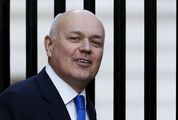SOMETHING has got to give. A declaration on Wednesday by Deputy Finance Minister Mcebisi Jonas that the Gupta family offered him an opportunity to replace his then boss, former finance minister Nhlanhla Nene, late last year has lit a fire in South African politics that will be impossible to extinguish without decisive action from the African National Congress (ANC).
Things are moving fast. The ANC national executive committee (NEC) will have an opportunity this weekend at a long-scheduled meeting that will now almost certainly devote itself to the issue of "state capture" or, more pointedly, to the extraordinarily close ties between President Jacob Zuma and his family and the Guptas.
With more evidence of, or pronouncements about, the extent of Gupta involvement in national and provincial political decisions looming, the party simply cannot afford to close the weekend’s discussions without a clear message.
At the very least, this would have to amount to an instruction to Mr Zuma that he cut his ties with the family — an instruction he would find almost impossible to comply with. But unless the instruction is delivered and unless the president agrees to comply with it, the ANC (and the country) will find itself in a crisis that could do it long-term damage.
It is all very well for the Guptas to deny Mr Jonas’s claim. Their problem is that Mr Jonas has loads of credibility, both inside and outside the ANC. The public, and, we suspect, large swathes of the ANC, will believe him and not the Gupta denials. Former ANC MP Vytjie Mentor has disclosed that she was offered a ministerial job by the Guptas and that Mr Zuma was in their Johannesburg home when that offer was made. She claims she can prove it. Former public enterprises minister Barbara Hogan claims Mr Zuma forced her to make appointments she was opposed to, presumably because those appointments suited the Guptas. Critically, ANC secretary-general Gwede Mantashe accused the Guptas on Thursday of "arrogance" in their dealings with the state. The stage for a lively NEC meeting is well and truly set.
No self-respecting constitutional democracy would entertain a situation in which a private business family has even remotely the influence on the head of state that the Guptas so evidently do in SA.
They have made one of Mr Zuma’s sons a vital business partner, and advanced him the money to become one. The resultant conflict of interest is so blatant it is hard to believe it has been allowed to continue as long as it has. The most surprising thing about Mr Jonas’s disclosure was not so much the content — the Guptas are widely believed to have involved themselves not only in ministerial appointments, but appointments to the boards of state-owned companies as well — but that it was made at all.
Other worms will slither out of this can. The fight between Finance Minister Pravin Gordhan and South African Revenue Service Commissioner Tom Moyane goes to the very heart of it. Mr Zuma is supposed to be dealing with that issue, but how can he possibly do so fairly while such a conflicted party to it?
In Parliament on Thursday, Mr Zuma seemed oblivious of the fact that the world’s biggest debt ratings agency, Moody’s has a team in SA right now assessing our credit worthiness. You’d never have thought Mr Jonas had, the day before, publicly reported what might amount to a criminal act by the Gupta family.
Little surprise, perhaps, that the Reserve Bank thought it necessary to raise interest rates for the second time this year.
SA is in this state, almost entirely, because of the quality of Mr Zuma’s leadership. He cannot afford to drop the Guptas and he cannot afford not to. Either way he damages himself. It is this dilemma the ANC has to help him with this weekend. Many hundreds of millions of rand are at stake in business ventures, deals and promises. Without political backing from on high, it is hard to see how the family businesses here might survive.
In our view, nonetheless, a statement of intent to cut ties with the Guptas is the very least the meeting should decide. The ANC should also forbid officers of the party and its government from interacting with them in any commercial way, on pain of expulsion. Their businesses will fall under various regulators and that should be where it stays.
The NEC should also end with a clear statement that it has asked the president to appoint a judicial commission with powers to investigate to the last detail all the Gupta ties with the state and the tax authority.
When this was first mooted, the Guptas said they would welcome one. Well, so would the country. Let it be done.

From left: Ajay Gupta younger brother Atul Gupta and Oakbay MD Jagdish Parekh and Duduzane Zuma , who is a son of the president. Picture: MARTIN RHODES
SOMETHING has got to give. A declaration on Wednesday by Deputy Finance Minister Mcebisi Jonas that the Gupta family offered him an opportunity to replace his then boss, former finance minister Nhlanhla Nene, late last year has lit a fire in South African politics that will be impossible to extinguish without decisive action from the African National Congress (ANC).
Things are moving fast. The ANC national executive committee (NEC) will have an opportunity this weekend at a long-scheduled meeting that will now almost certainly devote itself to the issue of "state capture" or, more pointedly, to the extraordinarily close ties between President Jacob Zuma and his family and the Guptas.
With more evidence of, or pronouncements about, the extent of Gupta involvement in national and provincial political decisions looming, the party simply cannot afford to close the weekend’s discussions without a clear message.
At the very least, this would have to amount to an instruction to Mr Zuma that he cut his ties with the family — an instruction he would find almost impossible to comply with. But unless the instruction is delivered and unless the president agrees to comply with it, the ANC (and the country) will find itself in a crisis that could do it long-term damage.
It is all very well for the Guptas to deny Mr Jonas’s claim. Their problem is that Mr Jonas has loads of credibility, both inside and outside the ANC. The public, and, we suspect, large swathes of the ANC, will believe him and not the Gupta denials. Former ANC MP Vytjie Mentor has disclosed that she was offered a ministerial job by the Guptas and that Mr Zuma was in their Johannesburg home when that offer was made. She claims she can prove it. Former public enterprises minister Barbara Hogan claims Mr Zuma forced her to make appointments she was opposed to, presumably because those appointments suited the Guptas. Critically, ANC secretary-general Gwede Mantashe accused the Guptas on Thursday of "arrogance" in their dealings with the state. The stage for a lively NEC meeting is well and truly set.
No self-respecting constitutional democracy would entertain a situation in which a private business family has even remotely the influence on the head of state that the Guptas so evidently do in SA.
They have made one of Mr Zuma’s sons a vital business partner, and advanced him the money to become one. The resultant conflict of interest is so blatant it is hard to believe it has been allowed to continue as long as it has. The most surprising thing about Mr Jonas’s disclosure was not so much the content — the Guptas are widely believed to have involved themselves not only in ministerial appointments, but appointments to the boards of state-owned companies as well — but that it was made at all.
Other worms will slither out of this can. The fight between Finance Minister Pravin Gordhan and South African Revenue Service Commissioner Tom Moyane goes to the very heart of it. Mr Zuma is supposed to be dealing with that issue, but how can he possibly do so fairly while such a conflicted party to it?
In Parliament on Thursday, Mr Zuma seemed oblivious of the fact that the world’s biggest debt ratings agency, Moody’s has a team in SA right now assessing our credit worthiness. You’d never have thought Mr Jonas had, the day before, publicly reported what might amount to a criminal act by the Gupta family.
Little surprise, perhaps, that the Reserve Bank thought it necessary to raise interest rates for the second time this year.
SA is in this state, almost entirely, because of the quality of Mr Zuma’s leadership. He cannot afford to drop the Guptas and he cannot afford not to. Either way he damages himself. It is this dilemma the ANC has to help him with this weekend. Many hundreds of millions of rand are at stake in business ventures, deals and promises. Without political backing from on high, it is hard to see how the family businesses here might survive.
In our view, nonetheless, a statement of intent to cut ties with the Guptas is the very least the meeting should decide. The ANC should also forbid officers of the party and its government from interacting with them in any commercial way, on pain of expulsion. Their businesses will fall under various regulators and that should be where it stays.
The NEC should also end with a clear statement that it has asked the president to appoint a judicial commission with powers to investigate to the last detail all the Gupta ties with the state and the tax authority.
When this was first mooted, the Guptas said they would welcome one. Well, so would the country. Let it be done.

























Change: 1.19%
Change: 1.36%
Change: 2.19%
Change: 1.49%
Change: -0.77%
Data supplied by Profile Data
Change: -0.19%
Change: 0.69%
Change: 1.19%
Change: 0.00%
Change: 0.44%
Data supplied by Profile Data
Change: 0.62%
Change: 0.61%
Change: 0.23%
Change: 0.52%
Change: 0.12%
Data supplied by Profile Data
Change: -0.21%
Change: -1.22%
Change: -0.69%
Change: -0.51%
Change: 0.07%
Data supplied by Profile Data